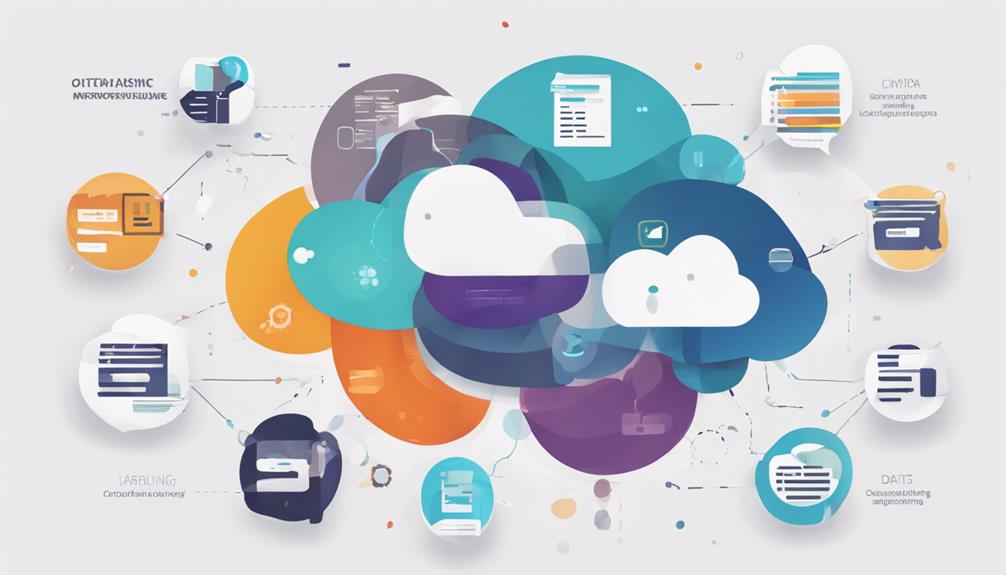You may not realize the extent of essential services for data management outsourcing. From safeguarding sensitive data to enhancing operational efficiency, these services play a vital role in today’s data-driven landscape. Imagine having access to a suite of expertise that ensures data security, quality assurance, compliance monitoring, and strategic decision-making support. The top 10 services in this realm are like a well-oiled machine, each component contributing to the seamless management and utilization of valuable data assets. Explore how these services can transform your data management practices and elevate your business operations to new heights.
Data Security Services
Data security services play a critical role in data management outsourcing, ensuring the protection of sensitive information from unauthorized access or breaches. Implementing data encryption solutions is a fundamental aspect of safeguarding data integrity. By encrypting data at rest and in transit, organizations can mitigate the risk of data interception and theft. Cybersecurity measures, such as firewalls, intrusion detection systems, and regular security audits, are essential components of a robust data security strategy. These measures help in detecting and preventing potential cyber threats before they can compromise sensitive information.
Privacy protection strategies are also integral to data security services. Implementing access controls, data masking techniques, and anonymization protocols can help protect personally identifiable information (PII) and ensure compliance with data privacy regulations. Risk assessment techniques play a crucial role in identifying vulnerabilities and assessing potential threats to data security. Conducting regular risk assessments enables organizations to proactively address security gaps and enhance their overall data protection measures. Data security services are indispensable in safeguarding confidential information and maintaining the trust of customers and stakeholders.
Data Processing Services
With data security services effectively in place, the focus now shifts to the realm of data processing services. Data processing services encompass crucial tasks such as data validation techniques to ensure accuracy and consistency in the information being handled. These techniques involve verifying and validating data to guarantee that it is correct, complete, and reliable for use in decision-making processes. Additionally, data enrichment strategies play a vital role in enhancing the quality and value of the data processed. By enriching existing data sets with additional information from reputable sources, organizations can gain deeper insights and improve their overall data quality. Implementing efficient data processing services not only streamlines operations but also lays a strong foundation for informed business decisions. Leveraging data validation techniques and data enrichment strategies can significantly enhance the effectiveness of data processing services, leading to better outcomes and improved data management practices.
Data Conversion Services
When considering data conversion services, it is crucial to prioritize file format expertise and quality assurance processes. Having a deep understanding of various file formats ensures seamless data transitions, while stringent quality checks guarantee accuracy and reliability. By focusing on these key points, data management outsourcing can streamline operations and enhance overall efficiency.
File Format Expertise
Proficient file format expertise is crucial when it comes to data conversion services. File format optimization ensures that data is efficiently transformed from one format to another, minimizing errors and preserving data integrity. By understanding various file formats and their structures, data management outsourcing providers can standardize data formats across different systems, enabling seamless data exchange and integration.
Expertise in file formats allows for the conversion of data into a standardized format that complies with industry requirements and regulations. This standardization enhances data accessibility, sharing, and analysis, ultimately improving decision-making processes. It also facilitates the consolidation of data from disparate sources into a unified format, enabling organizations to derive valuable insights from their data.
Data format standardization not only increases operational efficiency but also reduces the risk of data inconsistencies and inaccuracies. Through meticulous file format expertise, data management outsourcing services can ensure that converted data is accurate, reliable, and compatible with various systems and applications.
Quality Assurance Processes
To ensure the accuracy and reliability of data conversion services, implementing rigorous quality assurance processes is paramount. Data validation techniques play a crucial role in verifying that the converted data is consistent, complete, and error-free. By utilizing validation tools such as checksums, format validations, and data reconciliation checks, potential errors can be identified and rectified promptly.
Quality control measures are essential for maintaining high standards in data conversion services. These measures involve conducting regular audits, performance evaluations, and compliance checks to ensure that the data conversion processes meet predefined quality benchmarks. Implementing automated quality control checks can help streamline the process and minimize human errors.
Incorporating comprehensive quality assurance processes not only enhances the accuracy of data conversion services but also boosts overall efficiency and customer satisfaction. By continuously refining and optimizing quality assurance procedures, data management outsourcing providers can deliver reliable and high-quality services that meet the diverse needs of their clients.
Data Migration Services
Data migration services play a crucial role in the seamless transfer of data from one system to another. When considering data migration strategies, it’s essential to use effective data mapping techniques to ensure a successful transition. Data mapping involves determining how data fields from the source system align with the fields in the target system, ensuring that information is accurately transferred and compatible with the new environment.
A reliable data migration service provider will offer expertise in handling complex data structures, varying formats, and large volumes of information. They will employ proven methodologies to minimize downtime and data loss during the migration process. By understanding the intricacies of both the source and target systems, these professionals can execute the transfer efficiently and accurately.
Effective data migration services not only facilitate the movement of data but also ensure its integrity and security throughout the process. By entrusting your data migration needs to experienced professionals, you can streamline your operations and avoid potential disruptions associated with transitioning between systems.
Data Analysis Services
Utilizing advanced techniques for analyzing data is essential for making informed business decisions and gaining valuable insights into your operations. When considering data analysis services for outsourcing, keep in mind the following key aspects:
- Data Visualization Techniques: Implementing effective data visualization methods allows you to represent complex data in a visual format, making it easier to identify trends, patterns, and outliers. Visualizations such as charts, graphs, and dashboards enhance your understanding of the data and aid in decision-making processes.
- Predictive Analytics Strategies: By utilizing predictive analytics, you can forecast future trends and behaviors based on historical data. This proactive approach enables you to anticipate outcomes, optimize processes, and mitigate risks. Predictive models help in identifying opportunities for growth and improving operational efficiency.
- Statistical Analysis Tools: Leveraging statistical analysis tools enables you to analyze data sets, test hypotheses, and draw meaningful conclusions. These tools provide a scientific basis for decision-making and help in understanding the significance of data patterns. Statistical analysis is crucial for extracting actionable insights and driving strategic initiatives.
Data Governance Services
When considering data governance services for outsourcing, you should focus on key aspects such as compliance monitoring tools, data quality assurance, and policy development guidance. These services play a crucial role in ensuring that your data management processes align with regulatory requirements and industry standards. By leveraging these tools and guidance, you can enhance the integrity and security of your data assets.
Compliance Monitoring Tools
For effective data management outsourcing, the utilization of Compliance Monitoring Tools is crucial. These tools play a significant role in ensuring compliance tracking and regulatory monitoring. Here are three key aspects to consider when implementing Compliance Monitoring Tools:
- Automated Compliance Checks: Compliance Monitoring Tools offer automated checks to monitor data activities and ensure they align with regulatory standards. By automating these checks, you can proactively identify and address any compliance issues, reducing the risk of penalties or data breaches.
- Real-Time Alerts: These tools provide real-time alerts for any deviations from compliance requirements. By receiving immediate notifications, you can promptly address non-compliance issues, thereby enhancing data security and regulatory adherence.
- Comprehensive Reporting: Compliance Monitoring Tools offer detailed reports on compliance status and activities. These reports help in assessing the effectiveness of compliance measures, identifying areas for improvement, and demonstrating regulatory compliance to stakeholders and auditors.
Data Quality Assurance
Compliance Monitoring Tools play a pivotal role in maintaining regulatory alignment and data security within data management outsourcing. Data Quality Assurance involves implementing data validation techniques and data cleansing strategies to ensure the accuracy, completeness, and consistency of data. By utilizing data validation techniques, such as cross-field validation and format checks, you can identify and rectify errors in the data. This process helps in enhancing the overall quality of the data, making it more reliable for decision-making processes. Additionally, implementing data cleansing strategies like removing duplicate records and standardizing data formats further improves data quality.
Data Quality Assurance is essential for ensuring that the data used for analysis and decision-making is reliable and accurate. By employing these practices, you can enhance the effectiveness of your data management outsourcing. It is crucial to continuously monitor and improve data quality to uphold the integrity and value of your data assets.
Policy Development Guidance
Guiding organizations through the intricacies of establishing robust data governance policies is a critical component of Data Management Outsourcing services. When it comes to Policy Development Guidance, there are several key aspects to consider:
- Policy implementation strategies: Assisting companies in developing and implementing effective data governance policies tailored to their specific needs and organizational structure. This includes defining roles and responsibilities, establishing clear guidelines for data handling, and ensuring alignment with business objectives.
- Data regulations compliance: Ensuring that data governance policies adhere to relevant data regulations and standards to mitigate risks associated with non-compliance. This involves staying up-to-date with evolving data protection laws and incorporating necessary changes into the policies to maintain regulatory alignment.
- Data privacy frameworks and policy enforcement techniques: Incorporating robust data privacy frameworks into governance policies to safeguard sensitive information. Additionally, implementing effective policy enforcement techniques to monitor compliance, address violations, and maintain data integrity and security.
Data Quality Services
Data Quality Services play a crucial role in ensuring the accuracy, consistency, and reliability of data used within an organization. Utilizing data cleansing techniques like removing duplicates and correcting errors, along with data enrichment strategies to enhance existing data sets, helps maintain high data quality standards. Data profiling methods are employed to analyze data sets and understand their structure, quality, and integrity, enabling organizations to identify and rectify any anomalies or inconsistencies. Additionally, utilizing data standardization tools ensures that data is uniform and follows a set format, making it easier to compare and analyze.
Data Integration Services
When incorporating diverse data sources into your organization’s systems, the efficiency and coherence of your data management process can greatly benefit from proficient Data Integration Services. Data integration involves merging data from various sources, ensuring consistency and accessibility across your systems. Here are three key components to consider:
- Data mapping strategies: Effective data mapping is crucial for aligning data fields from different sources, enabling smooth integration and accurate data flow between systems.
- Data transformation techniques: Utilizing techniques such as normalization or aggregation helps convert data into a consistent format, ensuring compatibility and usability across platforms.
- Data synchronization methods: Employing synchronization methods ensures that real-time data updates are propagated accurately across all integrated systems, maintaining data integrity and consistency.
Data Warehousing Services
When considering data warehousing services, it is crucial to evaluate the data integration solutions offered by the provider. Additionally, exploring cloud storage options for your data can enhance scalability and accessibility. Ensuring robust security measures and compliance protocols are in place is essential to safeguarding sensitive information within the data warehouse.
Data Integration Solutions
With a growing demand for streamlined data management, companies are increasingly turning to Data Integration Solutions to enhance their operational efficiency. Data Integration Solutions play a vital role in consolidating data from various sources and formats into a unified view, ensuring coherence and consistency across an organization’s data landscape.
Key Aspects of Data Integration Solutions:
- Data Mapping Strategies: Implementing effective data mapping strategies is crucial for aligning disparate data sources and ensuring seamless integration.
- Data Transformation Techniques: Utilizing advanced data transformation techniques enables companies to convert data into a standardized format for unified processing.
- Data Synchronization Methods: Employing robust data synchronization methods facilitates real-time data updates and ensures data consistency across multiple systems.
Cloud Storage Options
Seeking efficient data storage solutions for your organization? Cloud storage options offer a flexible and scalable solution for managing your data effectively. One of the key benefits of cloud storage is its ability to provide secure data encryption methods, ensuring that your sensitive information remains protected at all times. By encrypting your data, you can mitigate the risks associated with unauthorized access and data breaches.
Cloud storage also offers the advantage of cost-effectiveness, as it eliminates the need for investing in expensive hardware and infrastructure. This pay-as-you-go model allows you to only pay for the storage you need, making it a cost-efficient solution for businesses of all sizes. Additionally, cloud storage provides increased accessibility and collaboration opportunities, enabling your team to access and work on data from anywhere in the world.
Security and Compliance
For organizations prioritizing secure data management and regulatory adherence, utilizing data warehousing services for security and compliance is essential. When it comes to maintaining the integrity and confidentiality of your data, data warehousing services offer specialized solutions tailored to meet the highest security standards and regulatory requirements.
Key Aspects to Consider:
- Data Encryption Protocols: Data warehousing services employ advanced encryption protocols to safeguard your sensitive information from unauthorized access or breaches. By encrypting data at rest and in transit, these services ensure that your data remains secure at all times.
- Regulatory Compliance Requirements: Data warehousing services assist organizations in aligning with regulatory standards such as GDPR, HIPAA, or PCI DSS. These services help you navigate the complex landscape of compliance requirements, ensuring that your data management practices meet legal obligations and industry standards.
- Continuous Monitoring and Auditing: Data warehousing services provide continuous monitoring and auditing capabilities to track data access, changes, and usage. This proactive approach enables organizations to identify and address security risks promptly, enhancing overall compliance and data protection measures.
Data Backup and Recovery Services
Utilizing data backup and recovery services is a critical component of effective data management outsourcing. Disaster recovery planning and backup strategies play a pivotal role in safeguarding your organization’s valuable data. By entrusting this aspect to a specialized service provider, you ensure that your data is securely backed up and readily recoverable in case of unexpected incidents.
Disaster recovery planning involves creating a comprehensive strategy to protect your data from potential threats such as cyber-attacks, natural disasters, or system failures. This includes establishing backup schedules, determining data retention policies, and outlining procedures for data restoration.
Backup strategies encompass the methods and technologies used to duplicate and store data securely. From cloud-based backups to on-premises solutions, choosing the right backup strategy depends on factors like data sensitivity, accessibility requirements, and budget constraints.
Partnering with a data management outsourcing provider that offers robust data backup and recovery services can provide peace of mind, ensuring that your organization’s data remains safe, accessible, and recoverable in times of need.
Frequently Asked Questions
How Can Data Management Outsourcing Help With Compliance Regulations?
Outsourcing data management for compliance is like having a trustworthy guide through a complex maze. It provides regulatory compliance assistance, ensuring you meet standards. With compliance audit support, experts navigate the rules, safeguarding your data practices.
What Measures Are in Place to Prevent Data Breaches During Outsourcing?
To prevent data breaches during outsourcing, data encryption ensures information security. Access controls limit unauthorized entry. Security protocols establish protection standards. Incident response plans swiftly address breaches. These measures collectively fortify data security and safeguard sensitive information.
Are There Options for Customized Data Management Solutions?
When it comes to customized data management solutions, options exist to tailor services to your specific needs while maintaining robust data security measures. These solutions offer flexibility and protection, ensuring your data is managed effectively.
How Is Data Accuracy Maintained During the Outsourcing Process?
To maintain data accuracy during outsourcing, you ensure data quality by implementing robust quality control checks. Streamline processes for optimal accuracy through continuous monitoring and feedback. By optimizing workflows and utilizing advanced technologies, you enhance overall data accuracy and reliability.
Can Data Management Outsourcing Facilitate Collaboration Between Departments?
Data management outsourcing can significantly improve efficiency and enhance communication between departments. By streamlining processes and providing a centralized platform for data access, collaboration becomes seamless, leading to better decision-making and overall business success.




